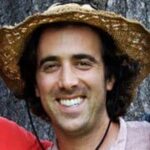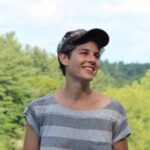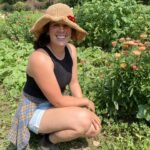Adamah Farm Fellowship
Now Accepting Applications for the 2024 Fellowships
Summer: May 20 – August 25 (apply by March 31) DEADLINE EXTENDED TO APRIL 15
Fall: August 21 – November 24 (apply by June 30)
Complete the short form to request the full application.
Submissions are reviewed on a rolling basis.
Systems of power disproportionately impact accessibility to programs like these for people of marginalized identities. We deeply value the leadership and participation of Jews of diverse backgrounds and experiences, related to class, ethnicity, race, sexual orientation, gender, ability and more.
We strongly encourage Jews of marginalized identities to apply.
In this time of terrible calamity and danger, we are praying for peace. When we plant seeds, when we tend saplings, when we dump food waste on compost piles for chickens to eat and for microbes to transform into life-giving fertilizer, we do so in the hopes that our prayers for peace reverberate through the soil that connects us all across distance.
עֹשֶׂה שָׁלוֹם בִּמְרוֹמָיו הוּא יַעֲשֶׂה שָׁלוֹם
Oseh shalom bimromav hu ya’aseh shalom
I’m a seed, Adamah has been my soil, and the people here have provided sunlight and water to help me grow more fully into myself.
Hana Zweibel
A Typical Day
A typical day is spent on our six-acre farm, in our commercial kitchen and on our goat pasture, helping to create a sustainable business that models ecological design, financial viability and social responsibility. Evenings are spent learning about Judaism and sustainability, building community and cultivating leadership skills. Our amazing staff and assortment of visiting faculty will help you listen to and follow your soul’s yearning for ecological and spiritual wholeness, recraft a Jewish identity that sings to you, and build relationships and skills that will sustain you for the rest of your life.
Prayer is meaningless unless it is subversive, unless it seeks to overthrow and to ruin the pyramids of callousness, hatred, opportunism, falsehoods. The liturgical movement must become a revolutionary movement, seeking to overthrow the forces that continue to destroy the promise, the hope, the vision.
Rabbi Abraham Joshua Heschel
Fellowship Fees
We have a sliding scale program fee and no one is turned away for lack of funds!
What should you pay?
Adamahniks come from all experiences in terms of class, racial barriers, and financial support from family or others. In recognition of the barriers faced by Jews of Color, we are we are prioritizing applications submitted by Jews of Color.
Together with foundation support, individual donations, and farm sales, fellowship fees are a critical component in covering the $10,000 cost per fellow of running the Adamah Fellowship.
Some fellows pay $5,000 to support us in making Adamah more financially accessible. Some pay $1,500. And some pay nothing.
We depend on each fellow to reflect deeply on their fellowship fees. If you have financial capacity, please contribute $3,600, or more if you have the means. If the fellowship fee looks like a barrier to you, please don’t leave the process- we are excited to see your application.
It may help to consider what it is that your program fee is helping to cover:
- A living wage for our full-time staff, who coordinate the fellowship, the farm, and educational sessions
- Seasonal Adamah Alumni residential farm staff
- Housing for Fellows, including all utilities
- Farm to table meals from our retreat center and Adamah House, valued between $15-40/meal.
- Food from our farm: organic produce, milk from our goats, lacto-fermented pickles, jams, and more
- Other food staples, and home and kitchen supplies
- Class materials and resources
- Field trips, including transportation
- Bikes for all!
When considering what you should pay please think about who in your family or community (e.g. Rabbi’s discretionary fund, synagogue, Jewish Federation or other organizations) might want to support you participating in the Adamah Fellowship. We assume that all applicants are looking into any options they have for accessing funds for fellowship fees.
If you have personal or family resources that enable you to pay the full $3,600 fee or more, we ask you to do so to help us make this program more accessible to others.
Check out this Income Bracket Guide and chart below by Resource Generation to help you determine where you might fall on our sliding scale. *Note that this information is a general guide that does not reflect reality for every individual. No one will be turned away due to lack of funds.
INCOME AND WEALTH: 2016 AND 2017 DATA

Three fictional scenarios around payment:
- Applicant 1 is from a middle income family who whose parents own their own house and have stable white collar jobs and retirement accounts. They paid for their child’s 4-year university degree. Although Josh has only worked at poorly paying service jobs for the past 2 years, he knows he can ask his parents and the synagogue he grew up in for help. Josh pays a $2500 fellowship fee.
- Applicant IV reads over the Resource Generation guide and table to figure out where they might fall on the scale. Their parents paid for their college tuition, and tells them they’ll receive an inheritance when they turn 26. They are currently a student, working part time, and living on their own. Their nuclear family income is over $300,000 a year. This applicant decides to pay over the full fellowship fee of $3,600, and pays $4,500 to support the effort to make Adamah more financial accessible for others.
- Applicant x is having trouble imagining how they’ll pay rent for three months without the monthly paycheck they usually rely on. Their supportive family is super excited to receive pickling advice after the applicant is an expert, but is also relying on a monthly paycheck to make rent.
Payment Schedule
You will be asked to indicate the program fee amount you can pay on our Payment Info form, which you’ll receive when you apply for the Fellowship.
Upon acceptance, you are asked to pay a $250 non-refundable deposit. We cannot reserve your place without the deposit. Full payment is required approximately two weeks before the start date.
Refunds
If you cancel for any reason in the two weeks before the start date of your Fellowship, you will receive a full refund minus the $250 deposit.
In the event that we have to cancel due to COVID-19 related health concerns, you will receive a full refund.
Testimonials
Adamah has taught me that it is possible to live in accordance with my highest ideals and provided me with knowledge, practical skills and relationships that will help me continue to do so.
Garth Silberstein
In these three months, I have felt the most present I have in my entire life, I have been blown away by the most supportive community I’ve lived in, and have been reconnected to values of environmental stewardship, service to others, gratitude, and compassion.
Rachel Salloway
Adamah allowed me to connect with chickens, the sunrise and a beautiful Jewish community. Adamah pushed me to ‘feel’ my Jewish roots and let go of my Jewish critiques.
Jordan Kahn-Tietz
I have really found a way to heal through Judaism and how to find myself and stay centered, which is more important to me then I could have ever predicted. I now look to Judaism in my every day life to help me heal, celebrate and really live and have fun in my life.
While at Adamah I have met more people who live out sustainable values in ways I had not witnessed before which brings me excitement and hope for my future life!
Adamah changed my life, made me a better, more well-rounded person, helped me build deep, meaningful connections, helped me think about my role and responsibility in this world, helped me connect to my Judaism in a powerful, beautiful way, taught me way more than I could have imagined learning in two months anywhere and any time in my life.
Liana
My experience at Adamah was truly life changing. I really think I left the program with a better understanding of what I want out of life and who I am. I am able to see things about life from a more holistic perspective. I had never felt a sense of community in my life before coming to the farm, and I must say, it is a beautiful feeling.
I came to Adamah knowing very little about farming and living in a manner that connects with and honors the earth was mostly foreign to me. It’s pretty amazing to me how in just 3 months, all of that changed. It has been an incredible journey of learning, spiritual awakening, connection with people and place, and has given me tools to continue this journey onward!
Adamah is the happiest and most purposeful I have ever felt in my life.
Noah
Equity Statement
We are committed to actively working to understand and address the ways that access to, and the content of, our programming and to the food we produce is affected by systems of power.
Programming
We actively seek to disrupt oppressive systems including, but not limited to, white supremacy, ashkenormativity, heteronormativity, male privilege, classism, and ableism by:
- Practicing inclusive recruitment and encouraging individuals with marginalized identities to apply to our programs
- Acknowledging indigenous territory and the history of the land we are on
- Operating our programs on a sliding scale with no one turned away for lack of funds
- Being gender inclusive in our facility access, introductions to one another, and programming
- Interrupting patterns of ashkenormativity by naming when we see it- questioning phrases like “Jewish looking” and Yiddish-centric Hebrew
- Having a plurality of traditions represented in our ritual life
- Interrupting heteronormativity by naming it when we see it, questioning assumptions around Jewish marriage or gender roles, and incorporating queer leadership in our ritual life
- Interrupting patriarchy by following the leadership of women and gender-queer staff and participants
- Integrating a lens of power, privilege and oppression into our lessons
- Using an equity lens when we teach about food systems including how systems of oppression affect access to land and healthy food
- Teaching about the intersections of racism and antisemitism and reflecting on our collective confusion about these issues and about how to dismantle them
- Teaching about the ways that racism is entrenched in our food system via federal laws and regulations
- Bringing in leaders from marginalized identities to our programs
- Increasing access to programming for individuals of a range of abilities
- Providing access to appropriate facilities for our participants, while maintaining transparency around accessibility and accommodation
- Providing culturally appropriate food for participants
Food distribution
Wealth inequality causes a lack of access to the basic human right of healthy, fresh food for people experiencing poverty. Historical and continuous racism undergirds a disproportionately low access to fresh food and growing land for People of Color. In an effort to dismantle these oppressive systems we operate our CSA on a sliding scale and distribute about 1/3 of the fresh produce we grow to partner organizations working in nutrition security via our Food Access Fund. Our partners include food pantries, section 8 senior housing and community centers, and immigrant support services.
Black Lives Matter
There is no future for the environmental sustainability movement or for renewing Jewish life on the land without actively dismantling the systems of racism that deny the most basic of truths that black lives matter. As we each look at the ways that racism infects our own minds and hearts, we also open our ears and stand in solidarity with visionary leaders of color like those whose work is linked to below. Jews in ALL Hues is an education and advocacy organization that supports multiple-heritage Jews and Jews of Color. The Jews of Color Field Building Initiative hosts “the nation’s first ever philanthropic and capacity building fund expressly dedicated to responding to racial injustice.” Not Free to Desist: An open letter from Black Jews, Non-Black Jews of Color, and our allies reimagines our collective Jewish covenant. Be’chol Lashon raises awareness of the diversity of among Jews while bringing “the Jewish commitment to civil rights and racial justice forward into the 21st century.” The Black Food and Justice Alliance embodies the “long history of resilience, self-determination and historical roots of Black food security, production and culture.”
Adamah Land Acknowledgment
As we gather in community, we acknowledge that the Adamah farm is on unceded Mahican land. The systems of oppression that annihilated and displaced Indigenous Peoples ring familiar to us as Jews in diaspora, as does the modern Indigenous movement to maintain cultural and spiritual practices.
Essential questions about what it means to be Jewish farmers on stolen land abound and we invite our community to join us in engaging the difficult questions. As a step toward decolonization and reconciliation, we honor the Indigenous People who have been on this land for thousands of years.
About This Statement
We at Adamah have long struggled to articulate the equity and justice activities we engage in without using those activities as a platform for self-promotion. We do not want to signal virtue or excuse ways in which we are unknowingly silent in the face of oppression and inequity. We are aware of and commit to continually noticing where this dynamic arises. For this reason, it is with some hesitation that we wrote the statement you are reading.
And, at the same time, we do want to highlight the ways that our program and our farm continue to shift toward interrupting oppression. If each of us in the Jewish and environmental movement remain silent about our actions for fear of being performative, it becomes difficult to learn from one another. The words above reflect a public commitment to growing and strengthening our work alongside others in the Jewish and environmental world.
The path toward justice and equity continues to evolve. We commit to the hard work of remaining open and vulnerable in order to evolve in tandem.
Adamah Farm Fellowship In the News
Transgender Jews are finding safe haven in an unexpected place: the farm , By Ben Harris, JTA, February 24, 2021
Cultivating Our Roots at Isabella Jewish Freedman Retreat Center , Connecticut Food & Farm Magazine, Summer 2018, Volume 13, June 22, 2018
Jewish Farming Takes Root, By Joe Baur, Tablet Magazine, October 19, 2021
My Daughter, the Farmer, January 2018, Hadassah Magazine
Our Favorite Pickles & Where to Find Them, September 2, 2015, Kosher Like Me
Beyond The Kibbutz: A Jewish Farm Renaissance, September 22, 2014, Civil Eats
New Gleanings from a Jewish Farm, July 23, 2014, New York Times
How Do I Teach My Suburban Kids to be Environmentally Conscious?, July 23, 2014, Kveller
Becca Weaver Joins Boulder JCC Staff as Sustainability Director, June 26, 2014, Boulder Jewish News
The Natural: Berkeley’s Adam Berman at the Root of Jewish farm Movement, February 13, 2014, JWeekly
5 Amazing Things You Did Not Know About The Adamah Fellowship, February 13, 2014, Buzzfeed
A Season of RENEWAL, April 11, 2011, RJ.org
Adamah Farm Staff

Shamu Sadeh
Managing Director of Education
Shamu is the co-founder of the Adamah Farm and Fellowship and has been taking people into the woods (Yeah Teva!) and on to the farm for 30 years. He loves leading morning prayers around the fire and schlepping goat fencing, mulch, or compost!
860.816.8973
Isabella Freedman

Janna Siller
Farm Director and Advocacy Coordinator
Janna leads the Adamah Farm crew in growing organic vegetables; teaches skills and food system context; and generates Jewish grassroots food advocacy opportunities. Physical work in the soil inspires her approach as a farmer, educator, and advocate.
860.816.8975
Isabella Freedman

Luna Manela
Adamah Farm Fellowship Director
After working with the Adamah Farm Fellowship as a farm apprentice for two years, Luna is honored to be back! Chances are you’ll find her singing around a campfire, creating shtick, or marveling at the natural world’s many wonders.
860.318.7412
Isabella Freedman
More from the Adamah Farm
